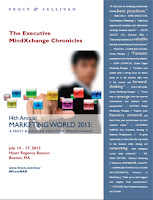
Where Worlds Collide: The Evolution of the B2B Consumer
Consumer
forces like mobile, 24/7 connectivity, customer empowerment, virtual
MODERATOR
Barbara
Glasser,
Senior Vice President, Head of Marketing, Corporate
Senior Vice President, Head of Marketing, Corporate
Communications
and Product Management,
Astoria Bank
Astoria Bank
PANELISTS
Christa
Carone,
Executive Vice President, Corporate Affairs, Communications &
Executive Vice President, Corporate Affairs, Communications &
Events,
Fidelity Investments
Fidelity Investments
Lisa
Connolly,
Senior Brand Manager,
INVISTA
Senior Brand Manager,
INVISTA
James
Gross,
Vice President, Global Marketing,
Brady Corporation
Vice President, Global Marketing,
Brady Corporation
Roseann
Harrington,
Vice President, Marketing, Communication & Community
Vice President, Marketing, Communication & Community
Relations,
Orlando Utilities Commission
Orlando Utilities Commission
Kevin
Murphy,
Global Hair Care Industry Leader, Xiameter at
Dow Corning
Global Hair Care Industry Leader, Xiameter at
Dow Corning
Jamie
Womack,
Vice President, Marketing & Branding,
CareerBuilder.com
Vice President, Marketing & Branding,
CareerBuilder.com
TAKE-AWAY
In a lot
of ways, B2C marketing is influencing how business is done on the B2B side.For example,
there’s a greater push in B2B marketing to become more personalized. The
panelists talked about some of the things they have learned from B2C marketing:
B2B
customers now expect the same features the B2C customers get, said James
Gross of the Brady Corporation. That includes ratings, reviews, personalization,
selector tools, and advanced searches. All these things are blurring
the line. Amazon is the fastest growing B2B company, or as Gross called it, B2E
(business to everything). In this new environment, the key is having the right
info at the right time and keeping messages consistent. B2B customers are trying to
collect as much information prior to buying as they can, so you need to make sure
they’re thinking of you.
A
lot of it comes down to dialogue, said INVISTA’s Lisa Connolly. What’s the personal
value in a B2B situation? You need to be able to have that dialogue to discuss
problems and solutions.
Another
key is the greater need for transparency in purchasing journeys, said Christa
Carone of Fidelity Investments. After the economic meltdown in 2008, Fidelity’s
phones were ringing off the hook. Customers were looking for help and asking
for the company’s point of view about the situation. Customers put a lot of trust
in Fidelity, and the company has built a whole division for planning and guidance
for clients. Everything is based on transparency to earn the trust and confidence
of customers.
BEST
PRACTICES
According
to an Ad Age survey of B2B marketing decision-makers, 52% of marketing budgets
will increase in the next year. The top three channels companies that will
focus on are
digital, events, and direct mail.
Panelists
agreed that content is king today. Companies need to have great content geared
toward the audience and medium. The average buyer looks at 10 pieces of content
before making a decision, so companies need to make sure they’re offering content
that potential customers find helpful during that process.
B2B
marketers are using all social media platforms to publish content. The group ranked
the platforms in order of effectiveness:
1.
LinkedIn
2.
Twitter
3.
YouTube
4.
Slideshare
5. Vimeo
To use
those tools effectively, messages must be short and sweet, panelists said. Mobile
doesn’t seem to be part of marketers’ plans yet, but is shifting. One-third
(33%) were
using mobile marketing in 2013, while the number will increase to 49% in 2014.
One
recommendation from the panel: Learn the language your customers’ companies use to
communicate with their customers, and make sure you communicate with them in a
similar way.
TAKE-AWAY
Many of
the audience members said that their companies use customer personas as part of
their marketing efforts. Panelists discussed their approach to personas: There are
different viewpoints on what personas are for, said CareerBuilder’s Jamie Womack.
Her team uses personas to humanize their efforts and keep the customer at the
center. They’ve looked at what B2C marketers have done well to determine how to adapt
that to the B2B world. The key is figuring out who the buyers are and what motivates
them to buy.
The idea
of the customer journey is also becoming commonplace in B2B, said Dow Corning’s
Kevin Murphy. As his team maps the customer journey, they define it in two distinct
phases. At every step, the company has an opportunity to be impressive or not.
BEST
PRACTICES
Today,
there’s a high-tech, high-touch paradigm; it’s easy to become overwhelmed by technology.
However, it’s critical not to lose sight of the personal side of marketing. How can
companies personalize their outreach in this landscape? Hosting and participating
in events is one example cited.
In
addition, create content that speaks to different personas. One big area to
focus on now is
finding messages that resonate with cross-generational audiences. Marketers
must also make sure there is alignment between what the companies say and
what they do. Content can be the bridge between the two.
